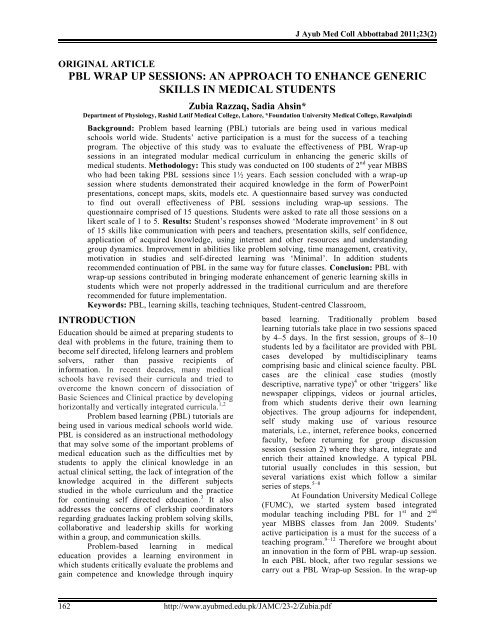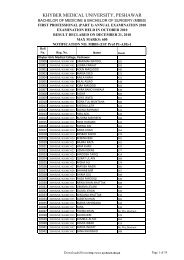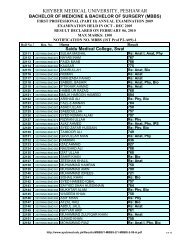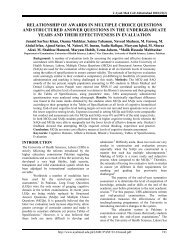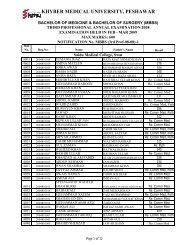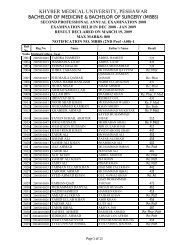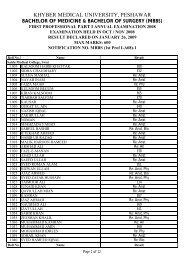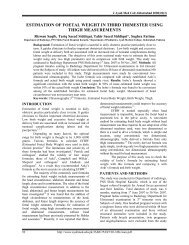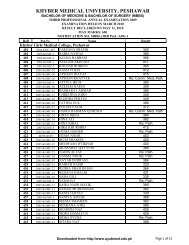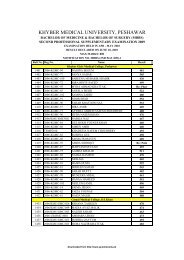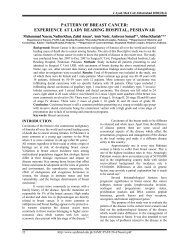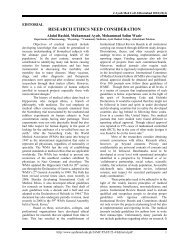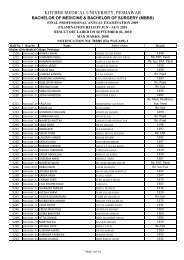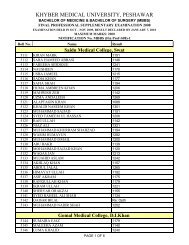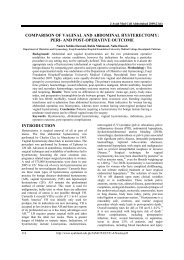pbl wrap up sessions - Ayub Medical College
pbl wrap up sessions - Ayub Medical College
pbl wrap up sessions - Ayub Medical College
Create successful ePaper yourself
Turn your PDF publications into a flip-book with our unique Google optimized e-Paper software.
J <strong>Ayub</strong> Med Coll Abbottabad 2011;23(2)<br />
ORIGINAL ARTICLE<br />
PBL WRAP UP SESSIONS: AN APPROACH TO ENHANCE GENERIC<br />
SKILLS IN MEDICAL STUDENTS<br />
Zubia Razzaq, Sadia Ahsin*<br />
Department of Physiology, Rashid Latif <strong>Medical</strong> <strong>College</strong>, Lahore, *Foundation University <strong>Medical</strong> <strong>College</strong>, Rawalpindi<br />
Background: Problem based learning (PBL) tutorials are being used in various medical<br />
schools world wide. Students’ active participation is a must for the success of a teaching<br />
program. The objective of this study was to evaluate the effectiveness of PBL Wrap-<strong>up</strong><br />
<strong>sessions</strong> in an integrated modular medical curriculum in enhancing the generic skills of<br />
medical students. Methodology: This study was conducted on 100 students of 2 nd year MBBS<br />
who had been taking PBL <strong>sessions</strong> since 1½ years. Each session concluded with a <strong>wrap</strong>-<strong>up</strong><br />
session where students demonstrated their acquired knowledge in the form of PowerPoint<br />
presentations, concept maps, skits, models etc. A questionnaire based survey was conducted<br />
to find out overall effectiveness of PBL <strong>sessions</strong> including <strong>wrap</strong>-<strong>up</strong> <strong>sessions</strong>. The<br />
questionnaire comprised of 15 questions. Students were asked to rate all those <strong>sessions</strong> on a<br />
likert scale of 1 to 5. Results: Student’s responses showed ‘Moderate improvement’ in 8 out<br />
of 15 skills like communication with peers and teachers, presentation skills, self confidence,<br />
application of acquired knowledge, using internet and other resources and understanding<br />
gro<strong>up</strong> dynamics. Improvement in abilities like problem solving, time management, creativity,<br />
motivation in studies and self-directed learning was ‘Minimal’. In addition students<br />
recommended continuation of PBL in the same way for future classes. Conclusion: PBL with<br />
<strong>wrap</strong>-<strong>up</strong> <strong>sessions</strong> contributed in bringing moderate enhancement of generic learning skills in<br />
students which were not properly addressed in the traditional curriculum and are therefore<br />
recommended for future implementation.<br />
Keywords: PBL, learning skills, teaching techniques, Student-centred Classroom,<br />
INTRODUCTION<br />
Education should be aimed at preparing students to<br />
deal with problems in the future, training them to<br />
become self directed, lifelong learners and problem<br />
solvers, rather than passive recipients of<br />
information. In recent decades, many medical<br />
schools have revised their curricula and tried to<br />
overcome the known concern of dissociation of<br />
Basic Sciences and Clinical practice by developing<br />
horizontally and vertically integrated curricula. 1,2<br />
Problem based learning (PBL) tutorials are<br />
being used in various medical schools world wide.<br />
PBL is considered as an instructional methodology<br />
that may solve some of the important problems of<br />
medical education such as the difficulties met by<br />
students to apply the clinical knowledge in an<br />
actual clinical setting, the lack of integration of the<br />
knowledge acquired in the different subjects<br />
studied in the whole curriculum and the practice<br />
for continuing self directed education. 3 It also<br />
addresses the concerns of clerkship coordinators<br />
regarding graduates lacking problem solving skills,<br />
collaborative and leadership skills for working<br />
within a gro<strong>up</strong>, and communication skills.<br />
Problem-based learning in medical<br />
education provides a learning environment in<br />
which students critically evaluate the problems and<br />
gain competence and knowledge through inquiry<br />
based learning. Traditionally problem based<br />
learning tutorials take place in two <strong>sessions</strong> spaced<br />
by 4–5 days. In the first session, gro<strong>up</strong>s of 8–10<br />
students led by a facilitator are provided with PBL<br />
cases developed by multidisciplinary teams<br />
comprising basic and clinical science faculty. PBL<br />
cases are the clinical case studies (mostly<br />
descriptive, narrative type) 4 or other ‘triggers’ like<br />
newspaper clippings, videos or journal articles,<br />
from which students derive their own learning<br />
objectives. The gro<strong>up</strong> adjourns for independent,<br />
self study making use of various resource<br />
materials, i.e., internet, reference books, concerned<br />
faculty, before returning for gro<strong>up</strong> discussion<br />
session (session 2) where they share, integrate and<br />
enrich their attained knowledge. A typical PBL<br />
tutorial usually concludes in this session, but<br />
several variations exist which follow a similar<br />
series of steps. 5–8<br />
At Foundation University <strong>Medical</strong> <strong>College</strong><br />
(FUMC), we started system based integrated<br />
modular teaching including PBL for 1 st and 2 nd<br />
year MBBS classes from Jan 2009. Students’<br />
active participation is a must for the success of a<br />
teaching program. 9–12 Therefore we brought about<br />
an innovation in the form of PBL <strong>wrap</strong>-<strong>up</strong> session.<br />
In each PBL block, after two regular <strong>sessions</strong> we<br />
carry out a PBL Wrap-<strong>up</strong> Session. In the <strong>wrap</strong>-<strong>up</strong><br />
162<br />
http://www.ayubmed.edu.pk/JAMC/23-2/Zubia.pdf
J <strong>Ayub</strong> Med Coll Abbottabad 2011;23(2)<br />
session students present their understanding of the<br />
Learning Objectives of the PBL case in the form of<br />
PowerPoint presentations, models, concept maps,<br />
videos, skits etc in front of their class. A specimen<br />
of topics covered in one of the <strong>wrap</strong>-<strong>up</strong> session in<br />
‘Skin and Musculoskeletal Module’ is shown in<br />
Table-1. The <strong>sessions</strong> are attended by most of the<br />
basic and clinical sciences faculty involved in the<br />
development and facilitation of that PBL case and<br />
students are provided with valuable feedback.<br />
Since this mode of running PBL with a detailed<br />
<strong>wrap</strong>-<strong>up</strong> session at the end is only practiced at<br />
FUMC in Pakistan, we investigated into the<br />
effectiveness of these <strong>wrap</strong>-<strong>up</strong> <strong>sessions</strong> in terms of<br />
enhancement of generic skills and learning<br />
attitudes of students and whether or not it should<br />
be continued for <strong>up</strong>coming classes.<br />
Table-1: Topics covered in a <strong>wrap</strong> <strong>up</strong> session by 1 st<br />
year MBBS students through power point<br />
presentation in PBL block titled ‘Ismail’s tragedy’<br />
a part of skin, musculoskeletal module<br />
Gro<strong>up</strong> 1 Muscles of shoulder joint & their nerve s<strong>up</strong>ply<br />
Gro<strong>up</strong> 2 Movements around shoulder joint<br />
Gro<strong>up</strong> 3 Excitation contraction co<strong>up</strong>ling<br />
Gro<strong>up</strong> 3 Radiography of shoulder joint<br />
Gro<strong>up</strong> 4 Basis of muscular hypertrophy and atrophy<br />
Gro<strong>up</strong> 5 Nerve injuries to <strong>up</strong>per limbs<br />
Gro<strong>up</strong> 6 Breaking bad news to a patient<br />
Gro<strong>up</strong> 7 Nerve conduction studies<br />
Gro<strong>up</strong> 8 Electromyography<br />
Gro<strong>up</strong> 9 Rehabilitation of patients<br />
Gro<strong>up</strong> 10 Medico-legal aspects of driving without license<br />
The objective of this study was to find out<br />
the effectiveness of PBL Wrap Up <strong>sessions</strong> for<br />
students of 2 nd year, and to decide on its<br />
continuation on the basis of students’ feedback.<br />
METHODOLOGY<br />
This study was carried out on second year MBBS<br />
students (Session 2009-2013) of Foundation<br />
University <strong>Medical</strong> <strong>College</strong>. This class of hundred<br />
students had been undertaking regular PBL<br />
<strong>sessions</strong> during their modules since first year<br />
MBBS. At foundation University <strong>Medical</strong> <strong>College</strong><br />
we are practicing PBL on Maastricht’s “seven<br />
jump” process with a little modification i.e.<br />
conducting a <strong>wrap</strong> <strong>up</strong> session at the end of the PBL<br />
When study was started second year<br />
students had gone through seven PBL blocks in<br />
first year and five PBL blocks in 2 nd year class.<br />
Each of these <strong>sessions</strong> concluded with a structured<br />
Wrap <strong>up</strong> Session.<br />
In every PBL block near the end of the<br />
second session students are provided with diverse<br />
topics in gro<strong>up</strong>s, covering all the Learning<br />
Objectives of PBL case (including both must to<br />
know and nice to know learning objectives), to<br />
prepare for their <strong>wrap</strong> <strong>up</strong> <strong>sessions</strong>. They are given<br />
choices to demonstrate their acquired knowledge in<br />
the form of power point presentations, models, role<br />
plays or concept maps. Students could take help<br />
from PBL facilitators, various websites, books and<br />
subject specialists acting as resource persons. In<br />
the <strong>wrap</strong> <strong>up</strong> <strong>sessions</strong> students were encouraged to<br />
present their work as a gro<strong>up</strong> reflecting creative<br />
and analytical thinking, humour, computer literacy,<br />
time management & presentation skills. Feedback<br />
from peers, facilitators and subject specialists was<br />
invited for enhancement of students learning.<br />
Class taking part in the study had been<br />
exposed to 12 PBL <strong>sessions</strong>. There were 100<br />
students in the class varying in age from 19–22<br />
years. We designed the study questionnaire to<br />
evaluate the effectiveness of <strong>wrap</strong> <strong>up</strong> <strong>sessions</strong> in<br />
enhancing the generic skills of students. The pilot<br />
questionnaire was run on a sample of 10 students.<br />
A few statements were found to be ambiguous and<br />
were corrected according to the student’s feedback<br />
to make them easily understandable. Revised<br />
questionnaire was distributed in the class during<br />
self study time. The questionnaire comprised of 15<br />
questions regarding acquisition of generic learning<br />
skills after PBL <strong>sessions</strong> (table 1). Students were<br />
asked to respond on a likert scale of 1 to 5 in the<br />
boxes provided where:<br />
1=No change, 2=uncertain, 3=Minimum improvement,<br />
4=Moderate improvement, 5=Definite Improvement<br />
RESULTS<br />
Survey response rate was 98%. Twenty-seven boys<br />
and 71 girls participated, 2 students were on leave.<br />
Averages and percentages for each response on<br />
individual survey question on given likert scale<br />
were determined along with overall percentage for<br />
each of the five response categories, from 98<br />
students (Table-2, 3).<br />
Students’ response showed ‘moderate<br />
improvement’ in 8 out of 15 skills like<br />
communication with peers and teachers,<br />
presentation skills, self confidence, application of<br />
acquired knowledge, using internet and other<br />
resources and understanding gro<strong>up</strong> dynamics.<br />
Improvement in abilities like problem solving,<br />
time management, creativity, motivation in studies<br />
and self directed learning was ‘minimal’. In<br />
addition 56% students recommended continuation<br />
of PBL <strong>sessions</strong> with <strong>wrap</strong>-<strong>up</strong>s for future classes.<br />
http://www.ayubmed.edu.pk/JAMC/23-2/Zubia.pdf 163
J <strong>Ayub</strong> Med Coll Abbottabad 2011;23(2)<br />
Table-2: Average responses of individual questions on a likert scale of 1–5<br />
S/No Questions Average Response<br />
1 Do you feel your problem solving skills have improved after PBL <strong>sessions</strong>? 3.3<br />
2 Do you feel your communication skills with peers have improved after PBL <strong>sessions</strong>? 4<br />
3 Do you feel your communication skills with teachers have improved after PBL <strong>sessions</strong>? 4<br />
4 Do you feel your interest / motivation in studies has increased? 3.4<br />
5 Do you feel your Planning /Organizing skills have improved? 3.3<br />
6 Do you find improvement in your time management skills? 3.3<br />
7 Do you find improvement in your presentation skills? 4<br />
8 Do you feel improvement in your self confidence? 4<br />
9 Do you find improvement in application of knowledge after PBL <strong>sessions</strong>? 4<br />
10 Do you find improvement in your creativity through PBL presentations? 3.4<br />
11 Do you think your level of adaptation to formal rules and policies has improved? 3.1<br />
12 Do you feel your ability of acquisition of knowledge from internet and other learning resources has increased? 4<br />
13 Do you think your ability to work as team improved? 4<br />
14 Do you find inculcation of self directed learning habits in your self? 3.2<br />
15 Do you recommend PBL <strong>sessions</strong> for next class? 4<br />
Table-3: Percentage (%) responses of individual questions in survey questionnaire on likert scale of 1–5<br />
Likert scale: 1 2 3 4 5<br />
Q1 Do you feel your problem solving skills have improved after PBL <strong>sessions</strong>? 6.38 4.2 29 41.4 19<br />
Q2 Do you feel your communication skills with peers have improved after PBL <strong>sessions</strong>? 3 7.2 16.4 42.2 30.9<br />
Q3 Do you feel your communication skills with teachers have improved after PBL <strong>sessions</strong>? 2 8.1 14.2 43.8 31.6<br />
Q4 Do you feel your interest / motivation in studies has increased? 11 12.2 20.2 37.7 18.3<br />
Q5 Do you feel your Planning /Organizing skills have improved? 11.4 8.3 27 38.5 14.5<br />
Q6 Do you find improvement in your time management skills? 11.2 10.2 28.5 34.6 15.3<br />
Q7 Do you find improvement in your presentation skills? 4 4.1 18.7 45.8 27<br />
Q8 Do you feel improvement in your self confidence? 8 3 12.2 47.9 28.5<br />
Q9 Do you find improvement in application of knowledge after PBL <strong>sessions</strong>? 6 9.2 23.7 30.9 29.8<br />
Q10 Do you find improvement in your creativity through PBL presentations? 9.1 11 27.5 35 17.3<br />
Q11 Do you think your level of adaptation to formal rules and policies has improved? 16.4 5 29.8 37.1 9.2<br />
Q12 Do you feel your ability of knowledge acquisition from internet and other learning resources has increased? 6.1 4 17.5 46.9 35<br />
Q13 Do you think your ability to work as team improved? 7.1 13.4 20.4 35 21.4<br />
Q14 Do you find inculcation of self directed learning habits in your self? 12.3 6 24.7 18.75 15.4<br />
Q15 Do you recommend PBL <strong>sessions</strong> for next class? 8.3 9 10.4 35 56.2<br />
1=No change, 2=uncertain, 3=Minimum improvement, 4=Moderate improvement, 5=Definite Improvement<br />
Table-4: Summary (overall improvement)<br />
SCALE 1=No change 2= Uncertain<br />
3= Minimum<br />
Improvement<br />
4= Moderate<br />
Improvement<br />
5=Definite<br />
Improvement<br />
Average No of Respondents/97 8 7.5 20.7 37 24<br />
Total Percentage 8.3 7.7 21.3 38 24.7<br />
DISCUSSION<br />
Learning in small gro<strong>up</strong>s helps students not only in<br />
attainment of knowledge but it also improves certain<br />
generic skills like better communication skills, problem<br />
solving, responsibility for own learning, team work and<br />
respect for other gro<strong>up</strong> members. 6<br />
PBL can be considered as a small gro<strong>up</strong><br />
learning methodology that combines the acquisition of<br />
knowledge with the improvement of generic skills and<br />
attitudes. Provision of clinically based scenarios as the<br />
stimulus for learning allows students to attain more<br />
knowledge resulting in better problem solving skills but<br />
also garners more interest in subject matter and makes<br />
them self directed learners. 7 PBL tutorials can be<br />
modified in several ways according to institutional<br />
circumstances and curricular need.<br />
Literature review reveals that greater student<br />
participation is required for more active learning.<br />
Studies at other institutes worldwide claim that<br />
practicing innovation in teaching, particularly with<br />
student involvement has beneficial outcomes. 8–12 Gentry<br />
pinpoints capabilities like self confidence, desire to<br />
achieve, analytical skills and teamwork abilities, as<br />
intellectual skills that students attain through a problem<br />
based learning that are hardly visible in a traditional<br />
classroom format. 13 This concluding <strong>wrap</strong>-<strong>up</strong> session<br />
activity for students was designed to improve their<br />
subject knowledge and overall professional grooming/<br />
competency, which is evident from students feedback<br />
where 73% students felt that their communication skills<br />
with peers and teachers had moderately improved<br />
whereas 41% students felt that their problem solving<br />
capability was also moderately improved. Almost 30%<br />
students felt definite improvement in their presentation<br />
skills, self confidence and internet operating skills.<br />
Fifty-six percent students were of definite view that<br />
these <strong>sessions</strong> should be continued for the future classes.<br />
Overall, 38% of our student body communicated an<br />
enhancement in their generic skills and learning<br />
164<br />
http://www.ayubmed.edu.pk/JAMC/23-2/Zubia.pdf
J <strong>Ayub</strong> Med Coll Abbottabad 2011;23(2)<br />
behaviour after having gone through PBL with <strong>wrap</strong> <strong>up</strong><br />
<strong>sessions</strong>. Our students’ achievement may be attributed<br />
to their active participation as also suggested by<br />
students’ feedback from University of KwaZulu-Natal,<br />
South Africa where gastrointestinal and endocrine<br />
pathophysiology was taught in an innovative way to<br />
improve understanding of the subject. Their students<br />
were reviewed on the basis of presentations, posters,<br />
written assignments and role plays. Over 50% of this<br />
study respondents indicated that presentations not only<br />
helped in their understanding but also encouraged them<br />
to use internet sites and reference books. They also felt<br />
more responsible for their learning. The innovative<br />
gro<strong>up</strong> activity had improved their social interaction,<br />
presentation and peer review skills. 14 Another result<br />
from a study by Prince et al. with 1,159 Dutch students<br />
from five medical schools showed that 83% of PBL<br />
graduates were satisfied with their training in<br />
communication skills like interaction with patients or<br />
other health professionals compared to 41% of non-PBL<br />
graduates. 15 There are number of studies and reports<br />
which suggest advantages of PBL curricula which are<br />
summarized in a review article by Koh et al in 2008.<br />
They deduced that PBL approach of teaching promoted<br />
social, emotional and cognitive competencies required<br />
by physicians. 16–18<br />
CONCLUSION<br />
We advocate acquisition of contextual knowledge as<br />
well as development of professional demeanour in<br />
our students. The results of twelve PBL tutorials with<br />
student centred concluding <strong>wrap</strong>-<strong>up</strong> <strong>sessions</strong> were<br />
encouraging. Students felt more confident in their<br />
overall learning abilities and attitudes and more than<br />
50% strongly recommended them for future classes.<br />
REFERENCES<br />
1. Patel VL, Jose Arocha JF, Branch T, Karlin DR. Relationship<br />
between Small Gro<strong>up</strong> Problem-Solving Activity and Lectures in<br />
Health Science Curricula. J of Dental Educ 2004;68(10):1058–80.<br />
2. Colliver JA. Effectiveness of problembased learning curricula:<br />
research and theory. Acad Med 2000;75:259–66.<br />
3. Albanese MA, Mitchell S. Problem based learning: a review of<br />
literature on its outcomes and implementation issues. Acad Med<br />
1993;68:52–81.<br />
4. Norman GR, Schmidt HG. The psychological basis of<br />
problembased learning: a review of evidence. Acad Med<br />
1993;67:557–65.<br />
5. Bennett NL, Davis DA, Easterling WE, Friedmann P, Green JS,<br />
Koeppen BM, et al. Continuing medical education: a new vision<br />
of the professional development of physicians. Acad Med<br />
2000;75:1167–72.<br />
6. Wood DF. ABC of learning and teaching in medicine: Problem<br />
based learning. BMJ 2003;326–8.<br />
7. Diana Dolmans, Henk Schmidt. The advantages of problembased<br />
curricula. Postgrad Med J 1996;72:535–8.<br />
8. Smits PBA, Verbeek JHAM, de Buisonjé CD. Problem based<br />
learning in continuing medical education: a review of controlled<br />
evaluation studies. BMJ 2002;324:153–6.<br />
9. Chickering AW, Gamson ZF. Seven principles for good practice<br />
in undergraduate education. Am Assoc Higher Educ Bull<br />
1987;39:3–7.<br />
10. Graffam B. Active learning in medical education: strategies for<br />
beginning implementation. Med Teacher 2007;29:38–42.<br />
11. Sefton AJ. Charting a global future for education in physiology.<br />
Adv Physiol Educ 2005;29:189–93.<br />
12. Sri Nageswari K, Malhotra AS, Kapoor N, Kaur G. Pedagogical<br />
effectiveness of innovative teaching methods initiated at the<br />
Department of Physiology, Government <strong>Medical</strong> <strong>College</strong>,<br />
Chandigarh. Adv Physiol Educ 2004;28:51–8.<br />
13. Gentry E. Creating Student-centered, Problem-based Classrooms.<br />
University of Alabama in Huntsville. URL:<br />
www.scimas.sa.edu.au/scimas/files/.../project_based_classroom.pdf<br />
14. Susan B, Higgins O, Mark T. Student perceptions of use of<br />
presentations as a method of learning endocrine and gastrointestinal<br />
pathophysiology. Adv Physiol Educ 2010;34:75–85.<br />
15. Prince KJ, van Eijs PW, Boshuizen HP, Vleuten van der CP,<br />
Scherpbier AJ. General competencies of problem-based learning<br />
(PBL) and non-PBL graduates. <strong>Medical</strong> Education<br />
2005;39(4):394–401.<br />
16. Koh GC, Khoo HE, Wong ML, Koh D. The effects of problembased<br />
learning during medical school on physician competency: a<br />
systematic review. CMAJ 2008;178(1):34–41.<br />
17. Parmelee DX, DeStephen D, Borges NJ. <strong>Medical</strong> Students’<br />
Attitudes about Team-Based Learning in a Pre-Clinical<br />
Curriculum. Med Educ Online 2009 Jan 7;14:1.:Available at:<br />
<br />
18. Hoffman K, Hosokawa M, Blake R Jr, Headrick L, Johnson G.<br />
Problem-based learning outcomes: Ten years of experience at the<br />
University of Missouri-Columbia School of Medicine. Acad Med<br />
2006;81:617–25.<br />
Address for Correspondence:<br />
Dr. Zubia Razzaq, 48-1, Lawrence Road, Lahore, Pakistan. Cell: +92-300-5336935<br />
Email: drzubiasoofi@hotmail.com<br />
http://www.ayubmed.edu.pk/JAMC/23-2/Zubia.pdf 165


